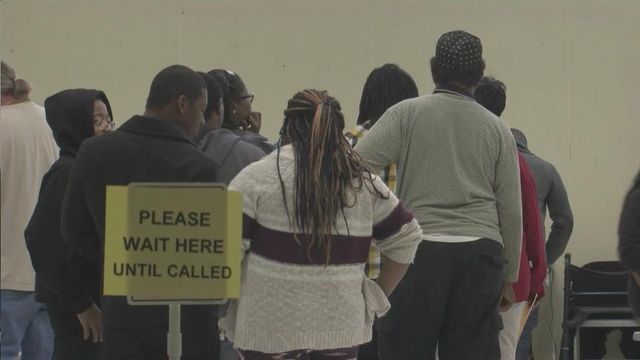Federal court strikes down NC congressional district maps
Three federal judges on Friday threw out the congressional voting maps the Republican-led General Assembly drew five years ago, ruling that two districts were gerrymandered along racial lines.
Posted — UpdatedThe ruling throws the March 15 primary into chaos, as the judges ordered state lawmakers to redraw the maps within two weeks and not to hold any elections for U.S. House until the maps are in place. A special session of the legislature would have to be called to approve new maps, and they might have to pass federal muster again.
Mail-in absentee voting started last week, and more than 8,600 ballots have already been requested and about 430 have already been filled out and sent back, according to the State Board of Elections.
The three-judge panel ruled that the 1st Congressional District, which spreads like an octopus across northeast North Carolina and has a tentacle that dips into Durham County, and the 12th Congressional District, which snakes along Interstate 85 between Greensboro and Charlotte, were drawn specifically so that the majority of voters in each were black.
G.K. Butterfield, the Democratic incumbent in the 1st District, is running unopposed until November, but Democratic 12th District Congresswoman Alma Adams faces two primary challengers.
"There is strong evidence that race was the only nonnegotiable criterion and that traditional redistricting principles were subordinated to race," 4th U.S. Circuit Court of Appeals Judge Roger Gregory wrote for the court. "In fact, the overwhelming evidence in this case shows that a (black voting-age population) percentage floor, or a racial quota, was established in both CD 1 and CD 12. And, that floor could not be compromised."
Lawmakers have maintained that the maps were drawn for Republican advantage and that race wasn't a driving factor, but the judges didn't buy that argument. Evidence showed that the partisan claim "was more of an afterthought than a clear objective," Gregory wrote.
"Elections should be decided through a contest of issues, not skillful mapmaking," U.S. District Judge Max Cogburn wrote in a concurring opinion. "Today, modern computer mapping allows for gerrymandering on steroids, as political mapmakers can easily identify individual registrations on a house-by-house basis, mapping their way to victory."
U.S. District Judge District Judge William Osteen Jr. said in a partial dissent that he doesn't believe enough evidence was presented to show that the 12th District was drawn based on the race of voters.
Sen. Bob Rucho, R-Mecklenburg, and Rep. David Lewis, R-Harnett, who led the redistricting effort, criticized the timing of the ruling and said the state would appeal.
"We are surprised and disappointed by the trial court's eleventh-hour decision that throws an election already underway into turmoil. Should this decision be allowed to stand, North Carolina voters will no longer know how or when they will get to cast their primary ballots in the presidential, gubernatorial, congressional and legislative elections," Rucho and Lewis said in a joint statement. "This decision could do far more to disenfranchise North Carolina voters than anything alleged in this case."
Bob Hall, executive director of good-government watchdog group Democracy North Carolina, said the judges shouldn't be blamed for ruling less than seven weeks before the primary.
"The mapmakers should have known better at the beginning of their power-grabbing exercise, paused to be a little less greedy and saved us all from the turmoil caused by their excessively partisan manipulation of election laws," Hall said in a statement. "Maybe they believe dividing voters by race serves their interests, but it actually undermines everyone’s faith in fair elections."
Sen. Josh Stein, D-Wake, who is running in the Democratic primary for attorney general, said a similar federal lawsuit is challenging the legislative maps drawn in 2011, and he hopes they are likewise found to be unconstitutional.
"This is very big for North Carolina and very big for our country. It’s a positive step for democracy," Stein said, adding that he was confident lawmakers can meet the Feb. 19 deadline for new maps.
The North Carolina Supreme Court has twice approved the congressional and legislative maps, ruling against voters and groups such as the NAACP that complained black voters were packed into a select number of districts.
"We are confident our state Supreme Court made the right decision when it upheld the maps drawn by the General Assembly and approved by the Obama Justice Department," Rucho and Lewis said.
Rev. William Barber, state president of the NAACP, said the federal court ruling validates the group's argument for the past five years that the voting districts are illegal.
"This ... court decision vindicates the record we first brought to the attention of the public – that the state legislature under (Senate President Pro Tem Phil) Berger and (former House Speaker Thom) Tillis had drawn racially biased unconstitutional voting districts," Barber said in an email to WRAL News. "This is a huge victory in our fight against 21st-century racism and discrimination."
Civil rights lawyer Adam Stein spoke at an NAACP news conference applauding Friday's three-judge ruling.
"Apartheid is not the way for our representatives to be elected," he said. "North Carolina citizens have been put into districts because of their race rather than where they live."
Meanwhile, good-government watchdog group Common Cause North Carolina said the ruling is the latest reason why an independent panel, not state lawmakers, should draw voting maps.
"For years, partisan gerrymandering has led to costly litigation and deprived North Carolina voters of having a real choice and a voice in our elections," Bob Phillips, executive director of Common Cause North Carolina, said in a statement. "Fortunately, a growing number of citizens and leaders across the political spectrum agree that North Carolina should adopt an independent redistricting process."
Related Topics
• Credits
Copyright 2024 by Capitol Broadcasting Company. All rights reserved. This material may not be published, broadcast, rewritten or redistributed.





